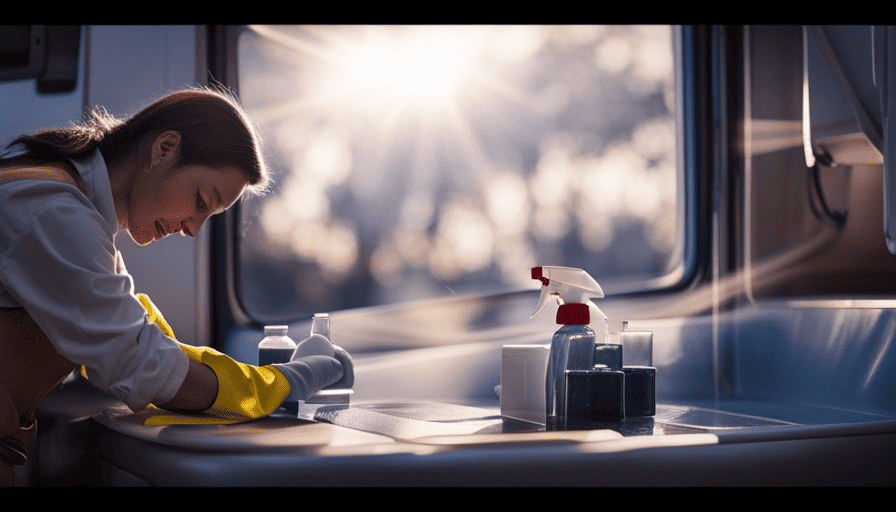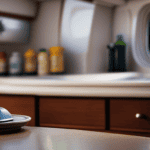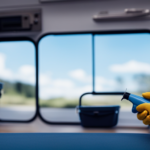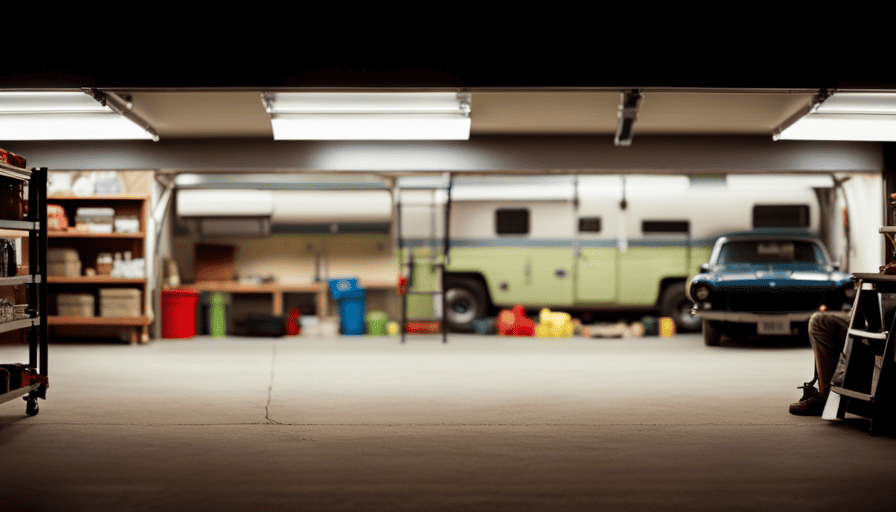Have you ever entered your camper and been hit with a strong odor? It can ruin your trip before it even starts. But fear not, I have the ideal solution for you.
In this article, I will share my tried and true methods for getting rid of those pesky bad smells in your camper. Whether it’s a musty odor from mold and mildew, a funky smell from the ventilation system, or even a foul stench coming from the plumbing, I’ve got you covered.
I’ll walk you through step-by-step, teaching you how to identify the source of the odor, clean and disinfect the interior, check and clean the ventilation system, and more. By the end of this article, you’ll be armed with the knowledge and practical tips to keep your camper smelling fresh and clean, ensuring that your next adventure is odor-free.
Key Takeaways
- Identify the source of the odor in the camper, such as mold, mildew, pet odors, or cooking smells.
- Use natural remedies like white vinegar, baking soda, or lemon juice to eliminate odors.
- Clean and disinfect the interior of the camper, including surfaces, fabrics, and ventilation systems.
- Prevent odors from returning by regularly maintaining and cleaning the camper, addressing plumbing issues promptly, and keeping it well-ventilated.
Identify the Source of the Odor
Now that I’m ready to tackle that foul smell in my camper, let’s start by figuring out where it’s coming from. Identifying the source of the odor is the first step in effectively eliminating it.
There are several common causes of bad smells in campers, such as mold and mildew, pet odors, cooking smells, and water leaks. To identify the source, I’ll first inspect the interior of the camper thoroughly, paying close attention to areas where moisture might be present, like under sinks and around windows.
Once I’ve identified the source, I can move on to finding effective home remedies to get rid of the odor. For mold and mildew smells, I’ll mix equal parts white vinegar and water in a spray bottle and use it to clean affected surfaces. Baking soda is also a great natural deodorizer that can be sprinkled on carpets, furniture, and mattresses, left overnight, and then vacuumed up the next day.
With the source of the odor identified and the appropriate home remedies in hand, I can now move on to the next step of cleaning and disinfecting the interior, ensuring that my camper smells fresh and inviting for my next adventure.
Clean and Disinfect the Interior
When it comes to cleaning and disinfecting the interior of a camper, there are a few key points to keep in mind.
The first step is to remove and wash any fabric items, such as curtains or cushions, as they can absorb and hold onto odors.
Next, it’s important to scrub all surfaces with appropriate cleaning solutions to ensure a thorough clean.
Finally, for any stubborn odors that linger, using vinegar or baking soda can be highly effective in neutralizing and eliminating them.
By following these steps, you can ensure a fresh and odor-free camper interior.
Remove and Wash Fabric Items
To banish that unpleasant odor from your camper, simply toss the fabric items, like curtains and cushions, into the washing machine for a thorough cleanse. Proper fabric care is essential when dealing with odor removal techniques.
Before washing, check the labels on your items to ensure they’re machine washable. Use a mild detergent and add a fabric softener to leave a fresh scent behind. For more stubborn odors, consider adding a cup of white vinegar to the wash cycle.
Once the items are clean, hang them to dry in a well-ventilated area.
As we move on to scrubbing surfaces with cleaning solutions, it’s important to remember that tackling the fabric items first will help eliminate any lingering smells and create a fresher environment inside your camper.
Scrub Surfaces with Cleaning Solutions
Scrubbing surfaces with cleaning solutions is an effective way to freshen up your camper and create a more pleasant environment. When it comes to cleaning techniques, it’s important to choose the right cleaning solutions for different surfaces in your camper.
For example, using a mild dish soap and water solution can be suitable for countertops, tables, and other non-porous surfaces. For tougher stains and odors, you may need to use a stronger cleaner specifically designed for campers. Be sure to follow the instructions on the cleaning products and test them on a small, inconspicuous area first.
Regularly cleaning surfaces not only helps to remove dirt and grime but also prevents future odors from forming. So, by incorporating these cleaning techniques into your routine, you can keep your camper smelling fresh and clean.
Now, let’s move on to the next section about using vinegar or baking soda for stubborn odors.
Use Vinegar or Baking Soda for Stubborn Odors
Using vinegar or baking soda is a game-changer for banishing those pesky lingering odors in your camper. These natural ingredients have powerful deodorizing properties that can effectively eliminate stubborn smells. Here’s why using vinegar or baking soda is the ultimate solution for your camper’s bad odors:
-
Vinegar is a versatile household item that can neutralize odors and kill bacteria. Simply mix equal parts vinegar and water, then wipe down surfaces and fabrics to eliminate smells.
-
Baking soda works wonders in absorbing and neutralizing odors. Sprinkle it liberally on carpets, upholstery, and mattresses, then vacuum it up after a few hours to freshen up your camper.
-
Lemon juice can also be used as an alternative deodorizer. Its natural citrus scent helps mask unpleasant smells in your camper.
-
Consider using air purifiers to eliminate odors and improve the air quality inside your camper.
Now, let’s move on to the next section and check and clean the ventilation system to ensure a fresh and odor-free environment.
Check and Clean the Ventilation System
Ironically, freshening up your camper’s ventilation system may seem like a breath of fresh air, but it’s essential to tackle the bad smell head-on. The first step is to check the air vents and ensure they are not clogged or obstructed. Over time, dust, dirt, and debris can accumulate in the vents, leading to unpleasant odors. Use a vacuum cleaner or a brush to remove any buildup and ensure proper airflow.
Next, inspect the air filters. These filters trap dust and allergens, but they can also become a breeding ground for bacteria and mold, resulting in foul smells. Replace the filters if they are dirty or damaged, and clean reusable filters according to the manufacturer’s instructions.
To add a level of sophistication to this section, here is a table summarizing the steps to check and clean the ventilation system:
| Steps to Check and Clean the Ventilation System |
|---|
| 1. Check air vents for obstructions. |
| 2. Remove any buildup using a vacuum or brush. |
| 3. Inspect air filters for dirt or damage. |
| 4. Replace or clean filters as necessary. |
By addressing the ventilation system, you are taking a proactive approach to eliminate mold and mildew, which we will discuss in the next section.
Eliminate Mold and Mildew
After checking and cleaning the ventilation system, it’s time to tackle another potential source of bad smells in your camper: mold and mildew. These pesky microorganisms thrive in damp, dark environments, making your camper an ideal breeding ground. Not only do they cause musty odors, but they can also pose serious health risks. So, it’s crucial to prevent mold growth and eliminate any existing mold or mildew.
To prevent mold growth, ensure proper ventilation by opening windows and using fans to circulate air. Keep moisture levels in check by using a dehumidifier or moisture-absorbing products. Regularly inspect and clean areas prone to moisture, such as the bathroom, kitchen, and storage compartments.
To remove musty odors caused by mold and mildew, start by identifying and addressing the source of the problem. Thoroughly clean affected areas with a mixture of water and vinegar or a commercial mold and mildew cleaner. Scrub the surfaces and let the solution sit for a while before rinsing thoroughly. Don’t forget to clean or replace any moldy fabrics or materials.
Now that we’ve tackled mold and mildew, let’s dive into another potential cause of bad smells in your camper: addressing plumbing issues.
Address Plumbing Issues
To keep your camper fresh and pleasant, let’s tackle any plumbing issues that may be causing unwanted odors. One of the common culprits for bad smells in campers is plumbing problems. If you notice a foul odor coming from your camper, it’s essential to check for any leaks that may be causing the issue. Fixing leaks promptly won’t only eliminate the smell but also prevent any further damage to your camper.
Another common plumbing issue that can lead to bad smells is clogged drains. Over time, debris and residue can build up in the drains, causing a foul odor to permeate your camper. To unclog drains, you can use a plunger or a plumbing snake to dislodge any obstructions. Additionally, there are commercial drain cleaners available that can help break down any buildup and eliminate odors.
Addressing plumbing issues is crucial in getting rid of bad smells in your camper. By fixing leaks and unclogging drains, you can ensure that your camper remains fresh and odor-free. In the next section, we’ll explore using natural deodorizers to further enhance the pleasant atmosphere of your camper.
Use Natural Deodorizers
When it comes to getting rid of bad smells in a camper, I’ve found that using natural deodorizers can be incredibly effective. One of the simplest things you can do is to open the windows and doors to let fresh air circulate throughout the space.
Another option is to place activated charcoal or baking soda in strategic locations, as these substances are known for their odor-absorbing properties.
Lastly, you can use essential oils or fresh herbs to add a pleasant scent to your camper. These natural deodorizers have always worked wonders for me, leaving my camper smelling fresh and clean.
Open Windows and Doors
Opening windows and doors is key to getting rid of bad smells in your camper. Ventilation is crucial in eliminating odors and freshening up the space. By opening up the windows and doors, you allow fresh air to circulate and replace the stale, musty smell that may be lingering.
Not only does this help remove unwanted odors, but it also helps to improve the overall air quality inside your camper. Natural air fresheners, such as essential oils or homemade sachets, can also be used in conjunction with proper ventilation to further combat bad smells. These can be placed strategically around the camper to provide a pleasant, fresh scent.
By incorporating these ventilation tips and natural air fresheners, you can effectively eliminate odors and create a more enjoyable camping experience.
Now, let’s move on to the next section and discuss how to use activated charcoal or baking soda to further eliminate bad smells.
Place Activated Charcoal or Baking Soda
One way to freshen up the air in your camper is by placing activated charcoal or baking soda. They act like odor-absorbing superheroes, eliminating unwanted scents and leaving your space as fresh as a mountain breeze. Both activated charcoal and baking soda are effective at absorbing odors, but they have slight differences.
Activated charcoal has a larger surface area and is more porous, making it more effective at trapping and neutralizing odors. Baking soda, on the other hand, is a natural deodorizer that can also absorb odors, but it may take a bit longer to fully eliminate strong smells.
Generally, it takes about 24 to 48 hours for activated charcoal or baking soda to work their magic and eliminate bad smells in a camper.
Now, let’s move on to the next step and explore how to use essential oils or fresh herbs to further enhance the freshness of your camper.
Use Essential Oils or Fresh Herbs
Enhance the freshness of your camper by infusing the air with the delightful scents of essential oils or the aromatic fragrance of fresh herbs. Not only will this help eliminate any lingering bad smells, but it’ll also create a calming and relaxing atmosphere.
Essential oils like lavender, chamomile, and eucalyptus can be used to promote relaxation and reduce stress after a long day of camping adventures. On the other hand, fresh herbs such as rosemary, thyme, and basil can be used for cooking delicious meals right in your camper.
Simply place a few drops of essential oil on a cotton ball or use a diffuser to spread the scent, or hang fresh herbs in bundles to release their natural fragrance. By incorporating these scents, you’ll be able to enjoy a fresh and inviting camper experience.
Now, let’s move on to keeping the camper clean and dry.
Keep the Camper Clean and Dry
To keep your camper smelling fresh, make sure it’s always squeaky clean and as dry as a bone. Preventing moisture is key to avoiding unpleasant odors. Here are some ventilation tips to help you achieve a clean and dry camper:
- Open windows and vents: Allow fresh air to circulate throughout the camper by opening windows and vents whenever possible. This will help eliminate any stagnant air and prevent moisture buildup.
- Use a dehumidifier: If you’re camping in a particularly humid environment, consider using a dehumidifier to remove excess moisture from the air. This’ll help prevent mold and mildew growth, which can cause unpleasant smells.
- Clean up spills immediately: Accidents happen, but it’s important to clean up any spills or messes as soon as they occur. This’ll prevent moisture from seeping into fabrics or surfaces and causing odors.
- Empty and clean water tanks: Regularly empty and clean out your camper’s water tanks to prevent bacteria and odors from developing.
By following these ventilation tips and keeping your camper clean and dry, you can ensure a fresh-smelling environment for your travels. Now, let’s move on to the next section about how to store food properly to avoid any unwanted smells.
Store Food Properly
Make sure you store your food properly to maintain a fresh and appetizing atmosphere inside your camper. Proper food storage is essential in preventing odors from lingering and spreading throughout the space.
One of the first things you should do is to invest in airtight containers or resealable bags for storing your food items. This will help to keep the smells contained and prevent them from seeping into other areas of the camper. Additionally, it’s important to keep perishable items, such as meats and dairy products, in a refrigerator or cooler with ice packs to maintain their freshness and prevent any unpleasant odors from developing.
When storing food in the camper, it’s crucial to keep it away from direct sunlight and heat sources. High temperatures can accelerate food spoilage and create strong odors. Find a cool and dry spot to place your food items, preferably in a pantry or cupboard away from the cooking area.
By following these proper food storage techniques, you can ensure that your camper remains odor-free and enjoyable. However, it’s important to remember that prevention is key.
In the next section, we’ll discuss some tips to prevent odors from coming back, ensuring a pleasant camping experience.
Prevent Odors from Coming Back
To prevent odors from coming back in my camper, I make sure to regularly clean and maintain it. This includes wiping down surfaces, vacuuming the floors, and airing it out whenever possible.
Additionally, I avoid smoking or engaging in strong-smelling activities inside the camper, as these can leave lingering odors that are hard to get rid of.
By following these simple steps, I can ensure that my camper stays fresh and odor-free for my next adventure.
Regularly Clean and Maintain the Camper
When you’re living in your camper, it’s important to regularly clean and maintain it to keep bad smells at bay. Here are some cleaning hacks and maintenance tips that I’ve learned from my own experience on the road:
-
Deep clean the carpets and upholstery regularly to remove any trapped odors.
-
Empty and clean the holding tanks frequently to prevent any unpleasant smells from lingering.
-
Use natural deodorizers like baking soda or vinegar to absorb and eliminate odors.
-
Keep the camper well-ventilated by opening windows and using fans to circulate fresh air.
By following these cleaning hacks and maintenance tips, you can ensure that your camper stays fresh and odor-free. It’s important to take these steps to avoid smoking or engaging in strong-smelling activities inside.
Avoid Smoking or Strong-smelling Activities Inside
If you want to keep your camper fresh and enjoyable, it’s best to avoid smoking or engaging in activities that produce strong smells inside. Preventive measures are essential to maintain a pleasant environment. Instead, take advantage of the great outdoors and engage in outdoor activities that won’t leave behind lingering odors. To help you further, here’s a handy table with some ideas for odor-free outdoor activities:
| Activity | Description | Benefits |
|---|---|---|
| Hiking | Explore nature while getting some exercise | Fresh air, beautiful scenery |
| Fishing | Relax by the water and enjoy the tranquility | Peaceful, stress-relieving |
| Camping | Set up camp and immerse yourself in nature | Bonding with family, enjoying the wilderness |
| Cycling | Pedal through scenic routes and feel the breeze | Cardiovascular exercise, adventure |
| Picnicking | Have a meal outdoors and soak up the sun | Quality time with loved ones, relaxation |
By avoiding smoking and engaging in activities that produce strong smells inside, you’ll prevent odors from permeating your camper. However, if you still find yourself struggling with persistent bad smells, it may be time to seek professional help.
Seek Professional Help if Needed
Sometimes, you just gotta call in the experts to tackle that stubborn bad smell in your camper, because as they say, ‘A stitch in time saves nine.’ When all else fails, seeking professional help for odor removal is a smart choice. These professionals have the knowledge and experience to identify the source of the smell and effectively eliminate it.
Here are three reasons why professional help is worth considering:
-
Specialized equipment: Professionals have access to advanced equipment specifically designed for odor removal. They use industrial-grade tools such as ozone generators and thermal foggers to neutralize even the toughest odors. These tools are highly effective in reaching every nook and cranny of your camper, ensuring a thorough odor removal process.
-
Expertise in odor elimination techniques: Professionals are well-versed in various techniques to eliminate different types of odors. They can determine the most suitable approach depending on the source of the smell, whether it’s from mold, mildew, pet urine, or other causes. Their expertise allows them to efficiently remove the odor without causing any damage to your camper.
-
Time and convenience: Hiring professionals saves you precious time and effort. Instead of spending hours or even days trying different DIY methods, professionals can quickly and efficiently eliminate the bad smell. This way, you can focus on enjoying your camper rather than dealing with unpleasant odors.
When it comes to stubborn odors in your camper, don’t hesitate to reach out to professionals for their expert help in odor removal. They have the necessary tools and knowledge to ensure your camper is fresh and odor-free, allowing you to fully enjoy your camping adventures.
Frequently Asked Questions
How often should I clean and disinfect the interior of my camper?
I recommend deep cleaning and sanitizing the interior of your camper at least once every season. This will help maintain a fresh and healthy environment for your travels.
To properly sanitize the interior, start by removing any dirt and debris. Then, use a mild disinfectant solution to wipe down all surfaces, including countertops, tables, and bathroom fixtures. Don’t forget to pay special attention to areas that are frequently touched.
Regular cleaning and sanitizing will keep your camper smelling clean and ensure a pleasant camping experience.
Can I use regular household cleaners to eliminate mold and mildew in my camper?
Yes, you can use regular household cleaners to eliminate mold and mildew in your camper. However, it’s important to consider the type of cleaner you choose. Natural cleaners, such as vinegar or hydrogen peroxide, can be effective and safer for the environment. Chemical cleaners can also work well, but they may contain harsh ingredients.
As for the common causes of bad smells in campers, they often stem from mold, mildew, or stagnant water.
Is it necessary to clean the ventilation system regularly?
Cleaning the ventilation system in your camper is absolutely necessary for maintaining a fresh and odor-free environment. Regular maintenance of the ventilation system offers numerous benefits, such as improving air quality, preventing the buildup of dust and debris, and eliminating any potential sources of unpleasant smells.
By ensuring that the ventilation system is clean and functioning properly, you can enjoy a comfortable and fresh-smelling camper all year round.
What are some natural deodorizers that can be used to get rid of bad smells in a camper?
When it comes to getting rid of bad smells in a camper, natural deodorizers can be a great alternative to chemical ones. I’ve found that DIY deodorizing solutions can work wonders in eliminating odors and freshening up the space.
From using baking soda to absorb unwanted smells, to creating a vinegar and water spray for a quick refresh, there are plenty of effective and natural options to choose from.
Let’s dive into some of these natural remedies and discover how they can bring a breath of fresh air to your camper.
How can I prevent odors from coming back after cleaning and deodorizing my camper?
To prevent odors from coming back after cleaning and deodorizing my camper, I recommend implementing some long-term odor control strategies.
First, make sure to keep the camper well-ventilated to avoid trapped odors.
Additionally, regularly clean and sanitize any surfaces that may harbor odor-causing bacteria.
Using odor-absorbing materials, such as baking soda or activated charcoal, can also help maintain a fresh-smelling camper.
Lastly, avoid bringing in items that may introduce strong odors, like dirty laundry or garbage.
Can the Methods for Getting Rid of Mothball Smell Also Work for Other Bad Odors in a Camper?
Yes, the methods for removing mothball odor camper can be effective for other bad odors in a camper. Ventilation, baking soda, activated charcoal, and vinegar are commonly used to eliminate stubborn odors. Deep cleaning the interior and using odor-neutralizing sprays can also help freshen up the space.
Conclusion
In conclusion, my fellow wanderers, banishing that foul stench from your beloved camper is a journey worth embarking upon. Just as a seasoned sailor navigates treacherous waters, we must identify the source of the odor and cleanse it with determination.
With a dash of elbow grease and a splash of disinfectant, we shall restore our haven on wheels to its pristine state. Remember to keep a vigilant eye on the ventilation system, conquer mold and mildew, and address plumbing woes swiftly.
By maintaining cleanliness and proper food storage, we shall triumph over odors and reclaim the fresh air of our nomadic abode. And fear not, for if the task proves too daunting, there are experts ready to aid us on our quest.
Bon voyage, my friends!



















